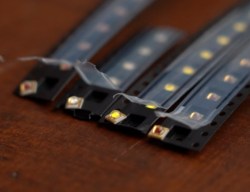[GreatScott!] He was saddened to find his greenhouse empty and lifeless in winter. So he continued to bring the greenhouse home. Well, at least a small part. He first decided to produce artificial sunlight and set up a simple initial experiment to play with LEDs of different wavelengths. How much can LED lights really affect plant growth? This is a research direction that Würth Elektronik has recently expanded with the support of its project. They worked through detailed application notes, explaining the biological aspects of an application—it's a treasure trove of freely available resources that hackers can and should learn from.
First, [GreatScott!] got LEDs in four different colors: red, "hyper red," deep blue, and the daylight spectrum. The first three are popular because their specific wavelengths are well absorbed by plants. The use of LEDs in daylight has been controversial. However, he notes that a plant may need different wavelengths for things other than photosynthesis, and daylight LEDs definitely help to assess plants visually during an experiment. 
Later, [GreatScott!] borrowed parts of Würth's LED driver designs to create an Arduino PWM controller with simple potentiometers. He used this to design his desk to accommodate the lamps.
The circuit board increases heat generation, which extends the life of the LEDs. [GreatScott!] Reattached the LEDs, only to find that the "too red" LEDs went out in the process. Fortunately, when this problem arose, you already had your official garden tool with a ready-to-use LED panel.
The test subjects were rocket plants [GreatScott!], the leaves of which are often found on bacon pizza. Creating an installation from two different sets of planters, one with LED lights and one without, she placed them in her window. The plants were evenly illuminated by sunlight and evenly watered. The duty cycle of an LED is specified in the hue values.
The results are amazing, as you can see in the image above: there are no variable changes except the LEDs used. This experiment, which also included a taste test with pizza as a test substrate, was a huge success, and [GreatScott!] recommends that we visit Würth for free samples on our plant breeding trips.
Horticulture (aka farming) is one area where hackers armed with freely available knowledge can succeed, and we're not even talking about which plants the commenters mention. The field of growing plants is literally fruitful and ripe for harvest. You can achieve a lot of change with surprisingly little effort. The value of plants on the windowsill should not be merely decorative, and the coffee table you put together can easily be expanded! Some hackers are aware of this and we are starting to see automated solutions grow even before the Raspberry Pi becomes a reality. The best part is that you only need a few LEDs to get started.
Continue reading “Plant Growth Accelerates Dramatically With LED Lights”


